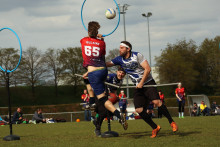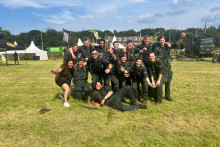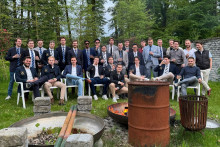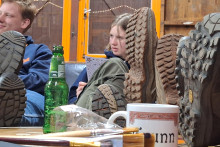Anyone who has devoured the Harry Potter series will, without a doubt, have imagined what it is like to manoeuvre on a flying broom to dodge a bludger and catch the golden snitch in an ultimate attempt. How different is our Muggle world, where we are forced to live with both feet on the ground. However, as of 2005 an equivalent of the ever-popular wizard sport has been realized.
Since 2016, the campus also has a club practicing the sport, the Twentse Thestrals. ‘It is a combination between handball, dodgeball and rugby,’ says Boyd Heitink, who works at the LISA service department as a system administrator. He is one of the early members and currently coaches the Twentse Thestrals. ‘The sport was first called quidditch. Nowadays, they are trying to make the sport big in the US, with big sponsorship deals. As a consequence, the terms from the book series have been abandoned as much as possible and the sport has been renamed to quadball, after the four balls used during matches.’
The game rules
Those spectating a quadball match for the first time will have to make some effort to discern logic in the apparent chaos. The sport is played with two teams of seven players each, on a rectangular pitch. On either side of the pitch are three hoops, defended by a goalkeeper. Each team has three players who try to throw a slightly deflated volleyball through the hoops. Each goal is worth 10 points.
In addition, each team has two players who have a total of three dodgeballs at their disposal. It is up to them to keep the opposing players from scoring. Those who are hit must return to one of their own hoops. And then there is a fifth ball in the game, a tennis ball encapsulated in a yellow sock, stuck to a so-called flagrunner, which enters the pitch after exactly 19 minutes. Each team has one player who tries to snatch that tennis ball, good for 30 points and the end of the match. Interestingly, each player has a PVC pipe wedged between their legs, originally meant to simulate a broomstick.
Inclusive and accessible
What makes the sport exhilarating? ‘The answer will differ from person to person,' Heitink states. ‘We have members who have played another sport at a high level and are now completely absorbed in the tactics. Someone else who is just starting out would prefer as many different positions as possible, even in the same match. But there are also people who have never played a sport before, or last did so a long time ago, and fully flourish.’
‘Regardless, the inclusive nature is what typifies the sport,’ Heitink continues. ‘That is an important aspect; you are allowed to field a maximum of four players per gender. In addition, non-binary people fall into a separate category. The sport wants to be accessible to all backgrounds and identities.’ Accessibility is also a key word for the Twente Thestrals. ‘With our team, you are allowed to be who you are while always being part of the whole. That's our strength. It's a team effort, it's never about the individual.’
European championship
Regarding sports achievements, the Drienerlo quadball players can boast an impressive record. Since the club was founded, only once did the national title go to a direct competitor, the Rotterdam Ravens. A fortnight ago, the Thestrals from Twente participated in the European Quidditch Cup in Golbey, France. The result was a honourable eighth place.
‘With 24 teams from all over Europe participating, our goal was to make the top 12, also in the light of a few injuries. That we eventually made it to the quarter-finals is really incredible,’ according to Heitink, who hopes for a stronger competition within the Netherlands. ‘It is a start-up sport in the Netherlands. The teams from Rotterdam and Wageningen give us a challenge from time to time. But more competition will allow all of us to get better.'
Tradition
Meanwhile, the Twenthe Thestrals are becoming an increasingly established name within the sport. With some 20 members – 17 of whom are active players – there is definitely room for growth in membership numbers, according to Heitink. He notes that such a membership is anything but linked to whether or not one idolises the Harry Potter series. ‘We have quite a lot of people who once became members for that reason, myself included. But nowadays, we also have some members who haven't read or seen anything related to Harry Potter.’
Nowadays, the association is also forming its own stories. ‘Of course we sometimes have a drink after a training session. But a regular feature is that we end every matchday at McDonald's. Any other restaurant is a no-go. In fact, to end our very first matchday, we were supposed to meet at a chicken restaurant, but two cars ended up at a McDonald's by mistake. Although it was clumsy, a nice tradition naturally developed as a consequence.’








